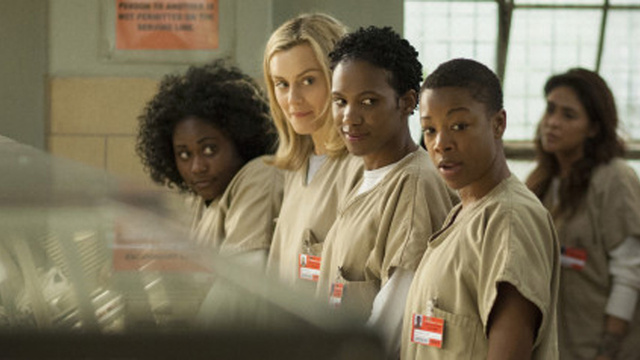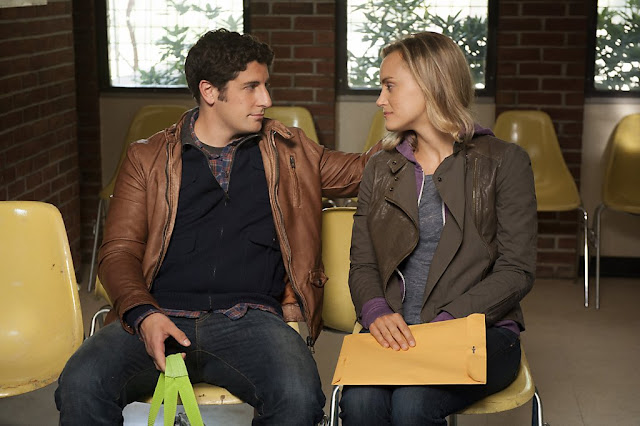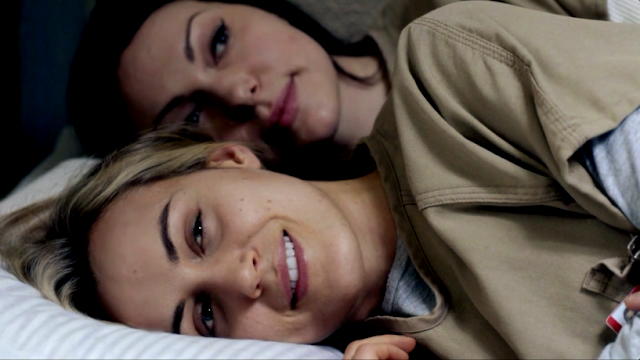Written by Robin Hitchcock
 |
| Orange is the New Black |
Orange is the New Black has more buzz than an apiary this summer, and with good reason: it’s funny, emotionally affecting, intensely watchable, and as a Netflix original series, suited to an immensely satisfying weekend binge-watch. But on top of all that, OitNB offers a lot to talk about beyond “Did you watch Orange is the New Black yet? It’s so great!”
It’s actually kind of a shame that Orange is the New Black is so revolutionary and fresh. The show has gotten a lot of attention and praise for the character Sophia, a black trans woman, portrayed by black trans woman Laverne Cox (and her twin bother M. Lamar in flashbacks, in some truly fortuitous casting). I wish that kind of representation didn’t seem so revolutionary and fresh, but honestly, it is still revolutionary and fresh merely for there to be a show mostly about women, much less one like OitNB that does its best to reflect womanhood as anything but monolithic and directly addresses race, class and sexuality.
 |
| Laverne Cox as Sophia |
Of course, the central and point-of-view character, Piper Chapman, is a privileged white woman–a Smith graduate whose mother is telling everyone she’s volunteering in Africa as an alibi for her 15 months in Federal Prison. Orange is the New Black does its best to address, challenge, and sometimes mock Piper’s privilege (she compares her prison-issue shoes to TOMS), but it can be frustrating that she is the focus while the audience has to wait many episodes for the serious treatment and backstories of some of the most compelling characters of color.
And it is fitting that the most interesting thing about Piper is her bisexuality, which is the one dimension she isn’t at the top of the hierarchy. Again, it shouldn’t be so fresh and unusual to have a bisexual main character, but it is. And Orange is the New Black doesn’t just use Piper’s sexuality as a representation token or an opportunity for hot girl-on-girl prison action, but as an actual platform to explore the complexities of sexual identity.
 |
| Larry (Jason Biggs) and Piper (Taylor Schilling) |
Piper enters prison engaged to a man, who had previously known nothing of Piper’s same-sex relationship with a drug trafficker ten years prior. Piper, her fiance Larry, and her future in-laws are all too happy to brush off that history as a long-passed phase. Larry only becomes nervous about Piper cheating on him in prison when he learns her ex-girlfriend Alex is also incarcerated there. She has to lecture him on the Kinsey Scale to point out that the presence of Alex isn’t going to “turn her gay.” When Piper (spoiler alert) does have sex with and fall for Alex again, it doesn’t make her fall out of love with Larry, defying the common portrayal of bisexuality involving some kind of toggle switch.
 |
| Piper and Alex (Laura Prepon) |
Orange is the New Black also side-steps the trope of Piper only being “gay for” one person. In a flashback sequence Piper tells her best friend Polly, “I like hot girls. I like hot boys. What can I say? I’m shallow.” [That’s also an absurdly simplistic representation of bisexuality, but absurd simplicity is fairly honest to Piper’s character.]
Piper’s sexuality is as hard for Alex to accept as it is for Larry, though. When their relationship hits the rocks, Alex angrily says she broke her rule number one: “never fall in love with a straight girl.” Alex bonds with Nicky, another lesbian inmate who had been having sex with another “straight” girl engaged to a man. Seeing these characters express frustration with bisexual characters’ ability to “opt-out” and enjoy heterosexual privileges puts Orange is the New Black‘s simple “Kinsey scale”/”I like hot people” depiction of bisexuality back into a realistically complicated and often painful context of negotiating sexualities.
Discussing Piper’s rekindled affair with Alex, Larry says to her brother Cal, “Is she gay now?” Cal says, “I’m going to go ahead and guess that one of the issues here is your need to say that a person is exactly anything.”
His issue and everyone else’s, Cal.
Robin Hitchcock is an American writer living in Cape Town, and that is not a WASP-y cover story for a prison stint.

Loved this post! I think you captured the confusion and struggles of relationships/sexuality very well! It is an amazing show to watch, I can’t wait for season 2!
They never use the word “bisexual” on the show, though.
No, none of them do. Which is annoying but I don’t know if it’s all that unrealistic. I’ve encountered a lot of that bi-erasure in real life too where people refuse to even see bisexuals (me) as bisexual. If I’m with a guy, ever, then I’m straight unless I fully renounce men for all eternity. And even then, I’m on probation. *shrug*
I wonder if that’s deliberate on the part of the show. Many people have specific (and wrong) perceptions of what the term “bisexual” means. Usually exactly what the article brings up, that someone is just bisexual as a phase until they pick a side, which is a misconception I’d argue every bisexual struggles with. And for the show to bring up the topic, without using the word itself, forces viewers to understand Piper (and more subtly Morello) as individuals rather than lumping them together under a mistaken concept. Without outright calling Piper bisexual, we have to learn to relate to her and both of her most influential romantic relationships, instead of letting less informed viewers dismiss her dalliance with Alex while in prison as another phase.
Sometimes leaving off a label can help/inform even more than trying to accurately explain it in the first place.
I always resent when bisexuality is explained as polyamory.
FINALLY i found an article on bisexuality in OITNB that doesn’t miss the point. thank you.
This is a fantastic article. It addresses the struggles of bisexuality in this show, and ultimately the world. Great work.